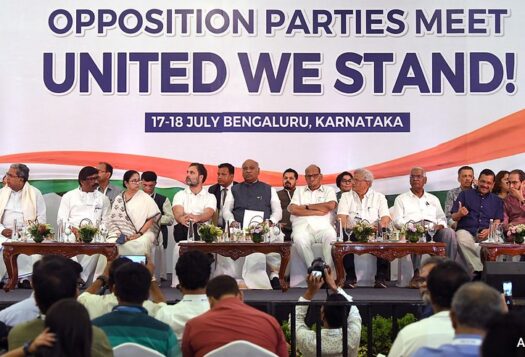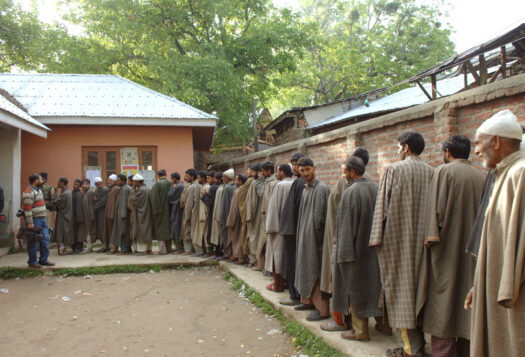
Jawaharlal Nehru University (JNU), synonymous in India with dissent and debate, has become the backdrop of a number of troubling developments. The latest being the arrest of Kanhaiya Kumar, the students’ union president, and two others on charges of sedition, whom the Modi government called “anti-national.” While Kumar has now been released on six months interim bail, one wonders what implications these events and this strand of nationalism will have for the citizenry and the future of the Indian nation state.
According to Benedict Anderson in his famous writing Imagined Communities, a nation is an “imagined political community”. Sustaining a democratic nation with a plural society requires great imagination. The Modi government branding its citizens as anti-nationals indicates a lack of imagination among the ruling right wing—a lack of imagination that can have dangerous consequences.
Current debates on Indian news channels indicate that the spectrum for discourse on nationalism in the country is limited. The vocabulary that sustains nationalism is held sacrosanct, and any attempt to deconstruct it is side-tracked. What this has done is empower the Bharatiya Janata Party (BJP) and Rashtriya Swayamsevak Sangh (RSS) to play politics with simplified jingoism.
The rise of this kind of politics is problematic. Incidents such as the JNU episode suggest something sinister about the right-wing scheme—a scheme that goes beyond the customary squabble with the largely liberal academic institutions. The tyranny of the grammar of nationalism is such that it creates hegemony, and threatens alternate articulations within the democratic space. Further, by disallowing alternate and divergent views, there is an attempt to create uniformity of thought, which in a way is as an act of thought-policing of the Orwellian kind. The BJP and the RSS know all too well that they cannot control what they cannot predict. Between hankering for citizens with predictable thought and vitiating dissent, the right-wing nationalists are increasingly coming across as authoritarian.
Politics of Vilification
Democracies like India are no strangers to vilifying rhetoric. This is thanks largely to the media and punditry that thrives on virulent discourse, exploiting the innate pleasure viewers experience when nasty things are said about those they dislike. This is compounded by the fact that such rhetoric serves political interest. However, BJP leaders labeling student activists as “anti-national” has created a furor.
But what part of “anti-national” enrages those on the other end of the political spectrum? First, there is a striking similarity in the usage of the words “anti-national” and “terrorist” in popular discourse in the country currently. This is worrisome because both words can be very manipulative. The double standards of the ruling dispensation are evident. While students who question capital punishment for Muslim convicts are labeled anti-nationals, right-wing activists who glorify Nathuram Godse, the killer of Mahatama Gandhi, do not get branded as such. This is similar to the ritual of of prejudiced media outlets in the United States after mass shootings labeling suspects of color terrorists while calling white suspects as mentally ill, in the pursuits to vilify or humanize based on identity. Second, it seems that such language is being used as an attempt to shut down debate on saffronization of educational institutions and, in a way, provide a new narrative and rationale for such action.
It is paradoxical that in an era of political correctness, language on national security does not require the guise of euphemisms. Such discourse has helped in casting the dissenter as evil—an “anti-national” citizen, whose sympathies do not have commonalities with the majority of the population. Someone who should face legal wrath for seeming to possess certain pathologies—the deviant mind which needs to be disciplined, whose presence is cancerous to society—and who does not deserve the sympathy of the masses.
Lack of Imagination
Modern nation states have their origin in Europe. Today, a supranational body, the European Union, has been set up. What we are seeing in Europe is the willingness of the political elite to experiment with concepts like sovereignty, which are rigid dogmas of the established order. Further, wartime industrial societies like the German society that was built on modern values of uniformity, discipline, and order are transitioning to postmodern multicultural societies that value individuality and autonomy. But what we confront in Modi’s India is the paradigm of power which is parochial and cannot tolerate the articulations of the activist, divergent, and the eccentric.
The Indian movement for independence was inclusive—it could accommodate in the same breath eccentric thinkers like Rabindranath Tagore, who did not find peace in artificial division of humanity, and Subhash Chandra Bose, who founded the Indian National Army. However, what we are seeing today in India is the hijacking of Indian nationalism by one group, the right-wing nationalists, which must be resisted.
India as an idea works fine, but one is apprehensive about Modi’s India. When students of JNU get charged with sedition, and a student of the Central University in Hyderabad allegedly commits suicide after being branded anti-national, I wish what Tagore wished for his fellow countrymen in his famous poem Gitanjali:
“Where the mind is led forward by thee into ever widening thought and action
Into that heaven of freedom, my Father, let my country awake.”
***
Image: Chandan Khanna-AFP, Getty


